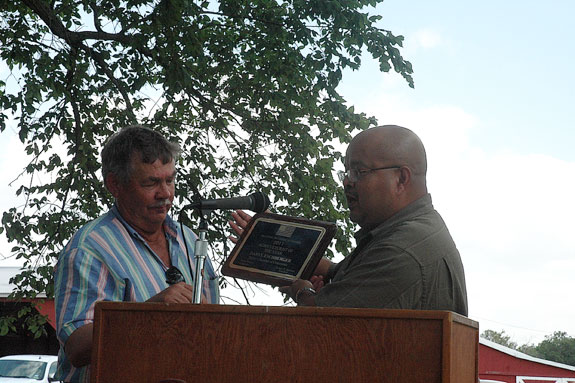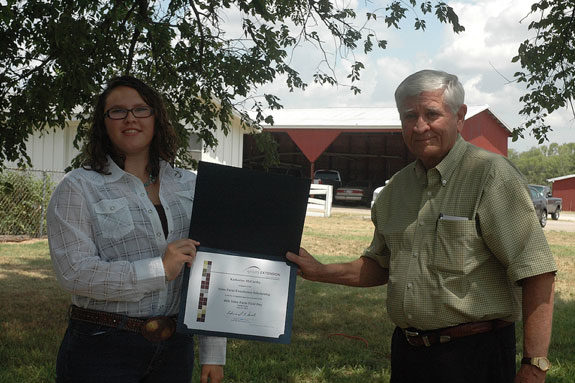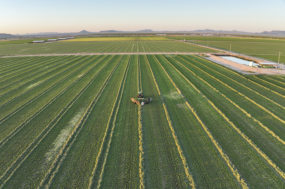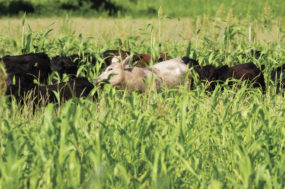Though there were no field tours for the 48th annual field day, discussions focused on aflatoxin affecting Texas corn crops, fertilizer carryover in drought conditions, farm safety and feral hog control methods.
“Though the drought changed our itinerary this year with our traditional field tours, I think producers came away with several informative discussions that they can take back to their farms and implement,” said Archie Abrameit, Texas AgriLife Extension Service specialist and farm manager.
“These are the driest conditions for eight months since records were first kept in 1895,” said Dr. Pete Gibbs, AgriLife Extension associate director, addressing attendees during the noon program.
“Both the Texas AgriLife Extension Service and Texas AgriLife Research stand ready to help the state’s farmers and ranchers.”
Gibbs said both agencies continue their respective work, researching drought-resistant crops and providing educational resources through various specialty departments.
Before the traditional noon barbecue meal, producers bowed their heads and joined First Baptist Pastor Glenn Scruggs in a prayer for rain.
The morning program featured Dr. Tom Isakeit, AgriLife Extension plant pathologist, providing an update on cotton root rot research and aflatoxin, a poison produced by a fungus that infects corn.
With the current drought causing many corn crops to fail, many producers may opt to bale it for hay or silage.
“I’d use caution with this,” Isakeit said. “If there is an ear of corn in there, there could be potential aflatoxin contamination. This is something we don’t want to go into dairy operations.” Isakeit also advised producers to test hay or silage for aflatoxin.
Dr. Mark McFarland, AgriLife Extension soil fertility specialist, gave a presentation on managing soil fertility in response to the drought.
He advised producers to take soil samples to determine how much residual nitrogen and other nutrients may still be in the soil and available for the next crop to utilize.

“Soil samples collected from the surface 6 inches will measure carryover fertilizer which can be substantial when drought reduces yields or causes crop failure,” McFarland said.
Taking a second, deeper sample from 6-18 inches or even as deep as 24 inches can detect additional residual nitrogen that can be credited to further reduce fertilizer costs.
“Potassium generally has not been an issue in the Blacklands since most clay soils are naturally rich in this nutrient,” McFarland said.
“However, in some areas, soil potassium levels are becoming marginal. When this is coupled with conditions that limit root activity, such as extremely dry or compacted soil, potassium deficiencies can occur and adversely affect crop yields.
Only by soil testing can one determine if a field is approaching this threshold so that fertilizer can be added if necessary.
“Overall, soil testing is the single most important nutrient management tool producers have. And, with rising fertilizer costs, it can have a major impact on production economics.”
During the event, Katherine McCarthy of Leander received a $4,500 Stiles Farm Foundation Scholarship. She plans to attend Texas A&M University and major in animal science.
Also, Daryl Eschberger was named Agriculturalist of the Year from Williamson County, receiving his award from Taylor Chamber of Commerce President Thomas Martinez as part of the noon program.
The Stiles Farm is a non-profit, self-supporting institution established by bequest of the late J.V. and H.A. Stiles for the advancement of agriculture to benefit all Texans.
A field day is held at the Stiles Farm each year to introduce producers to the latest research and best management practices. FG
—Source: Texas A&M press release
PHOTOS
TOP: Katherine McCarthy of Leander received a $4,500 Stiles Farm Foundation Scholarship. She is pictured with Dr. Larry Boleman, associate vice chancellor for outreach and strategic initiatives, Texas AgriLife Extension Service.
BOTTOM: Daryl Eschberger, Agriculturalist of the Year from Williamson County, receives his award from the Taylor Chamber of Commerce President Thomas Martinez. Texas AgriLife Extension Service photos by Blair Fannin











